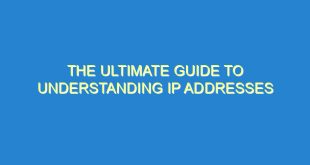Looking for an internet provider can be daunting, especially with the plethora of options available. With so many companies claiming to offer the fastest speeds, best prices, and most reliable connections, it can be tough to choose which one is right for you. But don’t worry, we’ve got you covered. In this article, we’ll take you through everything you need to know about internet providers near you.
What are Internet Providers?
Internet providers, also known as ISPs, are companies that offer internet access to their customers. They provide a connection to the internet via wired or wireless means, such as fiber optic cables, DSL lines, or satellite dishes. ISPs can also offer other services, such as email accounts, web hosting, and domain registration.
Types of Internet Connections
There are several types of internet connections available, and each has its own advantages and disadvantages. Here are the most common types:
1. Fiber Optic
Fiber optic internet is the fastest and most reliable type of connection available. It uses fiber optic cables to transmit data at the speed of light, resulting in incredibly fast download and upload speeds. However, fiber optic internet is not widely available yet and can be expensive.
2. DSL
Digital Subscriber Line (DSL) internet uses telephone lines to transmit data. It’s widely available and affordable, but the speeds are slower than fiber optic internet.
3. Cable
Cable internet uses the same coaxial cables that are used for cable TV. It’s widely available and offers fast speeds, but the connection can slow down during peak usage times.
4. Satellite
Satellite internet is available almost anywhere and is perfect for rural areas where other types of connections may not be available. However, it can be expensive and has slower speeds than other types of connections.
Factors to Consider When Choosing an Internet Provider
When choosing an internet provider, there are several factors to consider. Here are some of the most important ones:
1. Speed
The speed of your internet connection is one of the most important factors to consider. It determines how quickly you can download or upload data. Make sure you choose a provider that offers the speed you need for your online activities.
2. Price
Price is also an important consideration. Make sure you choose a provider that fits within your budget. Keep in mind that some providers may offer introductory prices that increase after a certain period of time.
3. Reliability
Reliability is crucial when it comes to internet connections. Make sure you choose a provider that offers a reliable connection, with minimal downtime and interruptions.
4. Customer Service
Customer service is important in case you experience any issues with your internet connection. Choose a provider that offers good customer service, with 24/7 support and a helpful team.
5. Data Caps
Some providers may impose data caps, which limit the amount of data you can use each month. Make sure you choose a provider that offers unlimited data or a data cap that fits your needs.
How to Find Internet Providers Near Me
Now that you know what to look for in an internet provider, it’s time to start your search. Here are some ways to find internet providers near you:
1. Google Search
A simple Google search for “internet providers near me” will yield a list of providers in your area. You can also use Google Maps to find providers near your location.
2. Online Comparison Tools
There are several online tools that allow you to compare internet providers in your area. These tools can help you find the best provider for your needs.
3. Ask Friends and Family
Ask your friends and family who they use for internet service and if they are happy with the provider. Personal recommendations can be a great way to find a reliable provider.
FAQ
- What is the best type of internet connection?
- How do I know what speed I need?
- What is a data cap?
- Can I switch internet providers?
- What should I do if I experience connection issues?
The best type of internet connection depends on your needs. If you need fast speeds and reliability, fiber optic internet is the best choice. If you’re on a budget, DSL or cable internet may be a better option.
The speed you need depends on your online activities. If you stream movies and play online games, you’ll need faster speeds. If you mostly use the internet for browsing and email, slower speeds may be sufficient.
A data cap is a limit on the amount of data you can use each month. If you exceed the limit, you may be charged extra fees or experience slower speeds. Make sure you choose a provider with a data cap that fits your needs.
Yes, you can switch internet providers at any time. However, you may be charged fees for early termination of your current contract. Make sure you read the terms and conditions of your contract before switching providers.
If you experience connection issues, contact your internet provider’s customer service team. They can help you troubleshoot the issue and resolve it quickly.
Conclusion
Choosing an internet provider can be overwhelming, but by considering the factors mentioned in this article, you can find the best provider for your needs. Remember to consider speed, price, reliability, customer service, and data caps when making your decision. Once you’ve chosen a provider, sit back, relax, and enjoy your reliable internet connection.
 SocketZone.com Internet Socket | Websocket Information Blog
SocketZone.com Internet Socket | Websocket Information Blog


